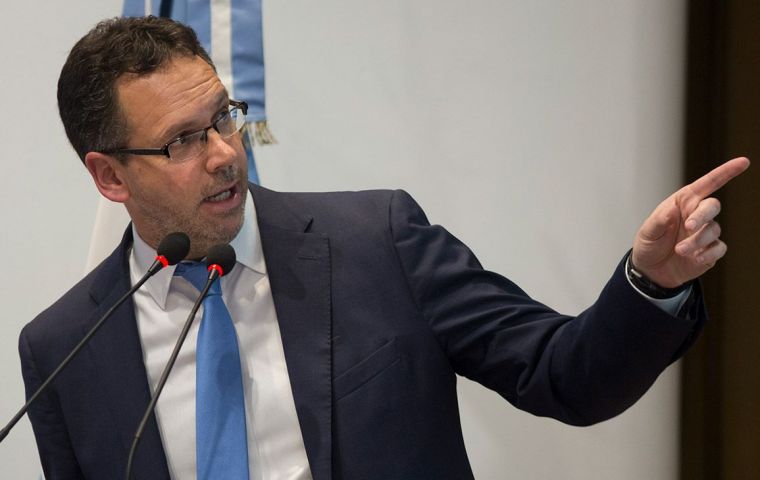MercoPress. South Atlantic News Agency
Argentina's central bank almost doubles currency swap with China
 Central Bank President Guido Sandleris, who was in China, said that the deal for 70 billion Yuan would be expanded by 60 billion Yuan
Central Bank President Guido Sandleris, who was in China, said that the deal for 70 billion Yuan would be expanded by 60 billion Yuan  Argentina and China first agreed to a currency swap program to boost its dwindling reserves in 2009 under former President Cristina Fernandez
Argentina and China first agreed to a currency swap program to boost its dwindling reserves in 2009 under former President Cristina Fernandez Argentina’s central bank said it would nearly double its currency swap deal with China, bringing the total to 130 billion Yuan (US$ 18.7 billion), as Beijing looks to expand its influence in the recession-struck country. Central Bank President Guido Sandleris, who was in China finalizing the agreement, said that the deal for 70 billion Yuan would be expanded by 60 billion Yuan, according to a bank spokesman.
“The agreement is practically done, minus some formal details to finalize the process,” Sandleris said.
Argentina and China first agreed to a currency swap program to boost its dwindling reserves in 2009 under former President Cristina Fernandez. Last year, under President Mauricio Macri, they agreed to extend the program for three more years.
China has used currency deals, financing for infrastructure projects and other investments to expand its influence in Argentina and across Latin America.
The swap agreement comes ahead of the high-profile G20 summit of the world’s major economies to be held in Buenos Aires at the end of November, which Argentina will host.
Argentina’s central bank has approximately US$ 54.25 billion in reserves, after the country signed a financing agreement with the International Monetary Fund last month. Argentina turned to external sources of financing after a bad drought and a run on the peso currency earlier this year sparked investor jitters over whether the country could service its international debts in 2019.
Sandleris assumed the role of central bank president in September after his predecessor unexpectedly resigned amid negotiations to expand the IMF agreement to US$ 57.1 billion, the largest in the fund’s history.
Under Sandleris, the peso has stabilized after the central bank initiated a policy to limit growth in the country’s monetary base. The policy aims to control inflation as the country struggles to pull itself out of recession.
“During the first month of our new monetary policy, we met the goal of zero growth in the monetary base, and we will continue to meet that goal in the coming months,” Sandleris said.




Top Comments
Disclaimer & comment rules-

Read all commentsMP: ”...the central bank (limited) growth in the country’s monetary base (aiming) to control inflation as the country struggles to pull itself out of recession.“
Nov 11th, 2018 - 06:24 am -1The brainless or ill-willed government sucks up cash out of the economy expecting to reduce inflation by virtually starving the marketplace.
These measures, mandated by the IMF as part of the conditions to keep the Macri government in life support while ensuring payments to creditors, will only deepen recessive conditions, causing huge suffering to Argentines.
And Macri has said time and again that his is the ”only way” to reach a celestial state of well-being.
For those who survive, of course.
Commenting for this story is now closed.
If you have a Facebook account, become a fan and comment on our Facebook Page!